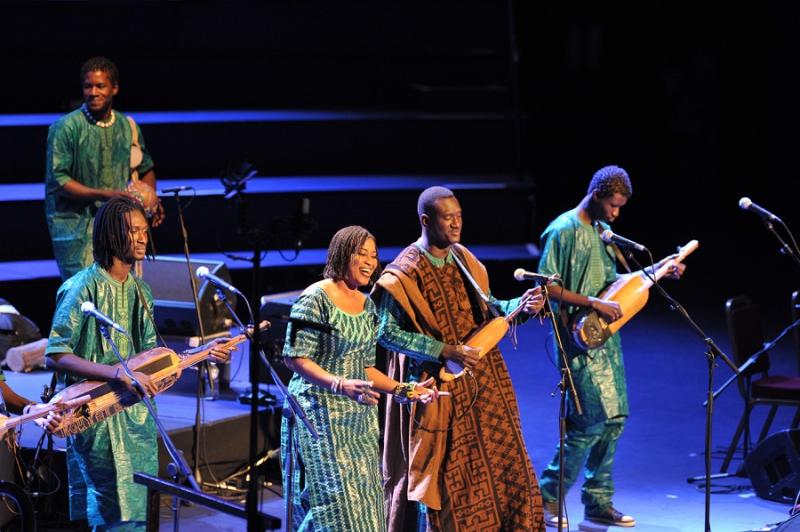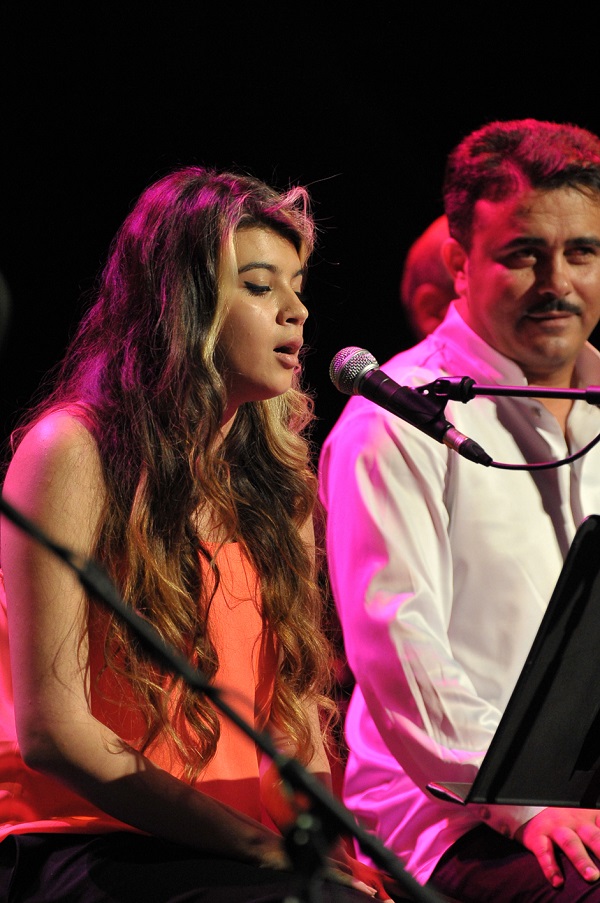Prom 54: World Routes | reviews, news & interviews
Prom 54: World Routes
Prom 54: World Routes
World Music celebration includes delights from Mali and Azerbaijan

Why are the Malians always punching way above their weight in music? There may be some historical reasons. The French always were more welcoming to the culture of their empire than the Brits (and more used to foreign-language music), while Paris became a great centre of West African music, from where it was disseminated over Europe.
This concert saw the debut of a highly appealing “chamber” Malian group Trio Da Kali, who play classy Mandé griot music – the trio consist of bass ngoni (lute), balafon (wooden-keyed xylophone) and the sweet, clear voice of Hawa Kassé Mady Diabaté (daughter of a legendary Malian singer). The pared-down line-up was a tremendous showcase for the sinuous and natural musicianship of the group. Often when you see a larger ensemble like the Symmetric Orchestra the colours are so varied they can become a blur.
 In fact, it was in the Symmetric Orchestra that I first caught the evening’s headliner Bassekou Kouyaté (in a Bamako club heaving with locals dressed up to the nines and dancing with nonchalant elegance). Bassekou has established himself over the last few years and three albums with his ngoni-driven group Ngoni ba. The impression was of something both bang-up-the-minute but with roots going back centuries. They have created an intense group energy and a real authority, able to tranfix both vast festival crowds and the less obviously conducive surroundings of a 25-minute set in the Albert Hall with festive songs like the title track of their last album Jama Ko, as well as pre-colonial songs like “Simaly”, while touching on Mali’s recent problems in “Ne me fatigue pas”.
In fact, it was in the Symmetric Orchestra that I first caught the evening’s headliner Bassekou Kouyaté (in a Bamako club heaving with locals dressed up to the nines and dancing with nonchalant elegance). Bassekou has established himself over the last few years and three albums with his ngoni-driven group Ngoni ba. The impression was of something both bang-up-the-minute but with roots going back centuries. They have created an intense group energy and a real authority, able to tranfix both vast festival crowds and the less obviously conducive surroundings of a 25-minute set in the Albert Hall with festive songs like the title track of their last album Jama Ko, as well as pre-colonial songs like “Simaly”, while touching on Mali’s recent problems in “Ne me fatigue pas”.
The other performers were on a completely different tangent, playing Mugham music from Azerbaijan. The performance was the culmination of this year’s World Music Academy in which a young musician gets mentoring from an established one, in this case 18-year-old Fidan Hajiyeva, who lives in London, and the established master of Mugham from Baku, Gochaq Askarov, whose dramatic voice was certainly impressive (Hajiyeva and Askarov pictured above right).
The quartet of musicians - including the four-stringed kamancha, oud and the oboe–like balaba - certainly intrigued and had moments of real atmospheric beauty, but they didn’t have quite the ease of group dynamics as Ngoni ba, whose bluesy music is naturally more accessible to a European audience. A problem for Askarov is that Alim Qasimov, one of the world’s great singers, also performs in this style. Coming in his wake must be akin to following in the footsteps of Bob Marley or Fela Kuti. Whereas Qasimov combines an academic approach with shocking fire and passion, this group were relatively bloodless, however accomplished as musicians. As for Fidan Hajiyeva, she isn’t the finished article but clearly has enormous talent and potential, and the freshness and sweetness of her voice was one of real highlights of the night.
rating
Explore topics
Share this article
Add comment
The future of Arts Journalism
You can stop theartsdesk.com closing!
We urgently need financing to survive. Our fundraising drive has thus far raised £49,000 but we need to reach £100,000 or we will be forced to close. Please contribute here: https://gofund.me/c3f6033d
And if you can forward this information to anyone who might assist, we’d be grateful.

Subscribe to theartsdesk.com
Thank you for continuing to read our work on theartsdesk.com. For unlimited access to every article in its entirety, including our archive of more than 15,000 pieces, we're asking for £5 per month or £40 per year. We feel it's a very good deal, and hope you do too.
To take a subscription now simply click here.
And if you're looking for that extra gift for a friend or family member, why not treat them to a theartsdesk.com gift subscription?
more New music
 Doja Cat's 'Vie' starts well but soon tails off
While it contains a few goodies, much of the US star's latest album lacks oomph
Doja Cat's 'Vie' starts well but soon tails off
While it contains a few goodies, much of the US star's latest album lacks oomph
 Mariah Carey is still 'Here for It All' after an eight-year break
Schmaltz aplenty but also stunning musicianship from the enduring diva
Mariah Carey is still 'Here for It All' after an eight-year break
Schmaltz aplenty but also stunning musicianship from the enduring diva
 Album: Solar Eyes - Live Freaky! Die Freaky!
Psychedelic indie dance music with a twinkle in its eye
Album: Solar Eyes - Live Freaky! Die Freaky!
Psychedelic indie dance music with a twinkle in its eye
 Album: Night Tapes - portals//polarities
Estonian-voiced, London-based electro-popsters' debut album marks them as one to watch for
Album: Night Tapes - portals//polarities
Estonian-voiced, London-based electro-popsters' debut album marks them as one to watch for
 Album: Mulatu Astatke - Mulatu Plays Mulatu
An album full of life, coinciding with a 'farewell tour'
Album: Mulatu Astatke - Mulatu Plays Mulatu
An album full of life, coinciding with a 'farewell tour'
 Music Reissues Weekly: Sly and the Family Stone - The First Family: Live At Winchester Cathedral 1967
Must-have, first-ever release of the earliest document of the legendary soul outfit
Music Reissues Weekly: Sly and the Family Stone - The First Family: Live At Winchester Cathedral 1967
Must-have, first-ever release of the earliest document of the legendary soul outfit
 Album: Robert Plant - Saving Grace
Mellow delight from former Zep lead
Album: Robert Plant - Saving Grace
Mellow delight from former Zep lead
 Brìghde Chaimbeul, Round Chapel review - enchantment in East London
Inscrutable purveyor of experimental Celtic music summons creepiness and intensity
Brìghde Chaimbeul, Round Chapel review - enchantment in East London
Inscrutable purveyor of experimental Celtic music summons creepiness and intensity
 Album: NewDad - Altar
The hard-gigging trio yearns for old Ireland – and blasts music biz exploitation
Album: NewDad - Altar
The hard-gigging trio yearns for old Ireland – and blasts music biz exploitation
 First Person: Musician ALA.NI on how thoughts of empire and reparation influenced a song
She usually sings about affairs of the heart - 'TIEF' is different, explains the star
First Person: Musician ALA.NI on how thoughts of empire and reparation influenced a song
She usually sings about affairs of the heart - 'TIEF' is different, explains the star
 Album: The Divine Comedy - Rainy Sunday Afternoon
Neil Hannon takes stock, and the result will certainly keep his existing crowd happy
Album: The Divine Comedy - Rainy Sunday Afternoon
Neil Hannon takes stock, and the result will certainly keep his existing crowd happy
 Music Reissues Weekly: Robyn - Robyn 20th-Anniversary Edition
Landmark Swedish pop album hits shops one more time
Music Reissues Weekly: Robyn - Robyn 20th-Anniversary Edition
Landmark Swedish pop album hits shops one more time

Comments
3 high quality groups at this